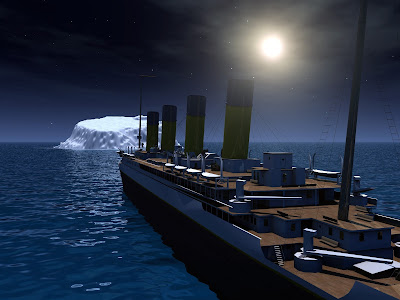Not every film you see at the cinema is going to win
Oscars. Sometimes you just want an evening out, some entertainment and pure
escapism. Even if the reviews don’t appear that favorable in advance, you can
usually trust Hollywood to provide an hour or so’s entertainment. It was with that
in mind that my son and I headed for our local cinema on a cold winter evening.
Passengers
offered more than we bargained for. Sometimes a diverting tale can reveal
serious undercurrents when you reflect afterwards.
Chemistry and asteroids
If the onscreen chemistry between Jennifer Lawrence
and Chris Pratt didn’t remind you of Kate Winslet and Leonardo DiCaprio in Titanic,
Hollywood seemed be dropping other hints. Hibernation pods that couldn’t possibly
go wrong? Think unsinkable Titanic on her maiden voyage - just replace the
iceberg with an asteroid.
Implausible v. plausible
Yes, the plot is probably full of holes. No doubt, any
knowledgeable scientist would tear it apart. We don’t have the science to make
5,000 people hibernate for 90 years until they reach a distant new colony on a remote
planet. I hope that we would possess the technology to communicate with Earth in
real-time by the time we can make people hibernate.
References to the Homestead company sent shivers down
my spine. The idea that the safety of thousands of lives would be placed in the
care of a private timeshare company with greedy shareholders was unnerving. It seemed
so plausible.
Chris Pratt, initially the only human awake on board,
is reminded of the astronomical bills that he is running up. The Titanic
similarity is further underlined when he discovers the nutritional difference
between a third-class and first-class breakfast. By that time, he’d been eating
the former for a year with all the other 5,000 passengers asleep. Their lives
end up depending on the out-of-the-box thinking of this third-class engineer.
AI's Limitations
Our hero engineer also spends a year trying to break
into the hibernating crew’s quarters. All the spaceship’s controls are designed
to keep passengers out. The ship is designed to repair itself. It’s a warning
for the direction that artificial intelligence (AI) is currently taking. The
Internet of Things is already poised to take control. Humans design machines to
deal with any risk or worst case scenario that they can dream up. How they are supposed
to design spaceships to go into the Unknown beats me.
We still can’t get cinema/train ticket machines, Wi-Fi,
computers or printers to work 100% reliably without human intervention. There’s
a risk that we will stop training basic engineering skills or out-of-the-box
thinkers and dispense with capable human standbys.
The robot barman highlights the serious issue with AI.
He’s programmed to handle cheerily all the normal human soul-searching associated
with the role. He’s happy endlessly polishing glasses even in a life or death
crisis. His inability to handle the complexity of human ethics puts the only
two humans awake on the spaceship in near-murderous conflict. He isn’t programmed
to deal with the complex set of circumstances before him. It isn’t supposed to
happen – like the Titanic sinking.
Pure Hollywood fiction?
This is just a Hollywood film. I wonder. If you worked
in total secrecy at NASA and were uneasy about some of the ethical decisions
and directions being taken, how would you handle it? Get the US President to
speak to the people like they do in the alien and apocalypse movies? It always
causes widespread panic and rioting.
Gracious. The President-elect is causing enough
worldwide consternation by his very appointment. If I were in NASA, I would get
Hollywood to explore scenarios. Come to think of it, there’s quite a glut of
space movies of late.
The New World
Space exploration is exciting. It’s the new frontier,
the New World all over again. Leaving planet Earth even with thousands of
first-class passengers would mean leaving billions of ‘second- and third-class’
human beings behind.
We still don’t know enough about the long-term health
effects on astronauts - usually the fittest among us. I noted that an astronaut
died of cancer at Christmas. We do know that the best international scientific
expertise and resources are devoted to exploring how we could live and survive
in space.
Space colonies sound like a Kennedy PR exercise given
that the world’s problems are piling up. Why are the world’s best brains
working on them?
Priorities?
What about making global warming solutions and feeding
an ever-growing world population on Earth the major international priorities? The
World’s population is estimated at between 7.4 and 7.5 billion as I type. The
United Nations predicts that it could reach 9.7 billion by 2050 and over 11
billion by 2100. In a March 2016 article for the BBC, David Satterthwaite of the International Institute for Environment and Development in London said:
“It is
not the number of people on the planet that is the issue –
but the number of
consumers and
the scale and nature of their consumption’.
What about sorting out the United Nations or creating
a new global body so that no rogue nation can threaten global security with the
technology that we have already got?
I know, I know. I’m daydreaming. Passengers is just a
Hollywood movie.
Still, it’s alarming to be a Passenger on Planet Earth in
Third Class locked out of the cockpit. People are questioning the new Captain’s
suitability and motives to handle the dark times ahead. Artificial Intelligence
may end up rearranging the deckchairs on the Titanic*.
*rearranging the deckchairs on the Titanic
Cambridge Advanced Learner's Dictionary and Thesaurus definition: used for saying that someone is wasting time dealing with things that are not important, and is ignoring a much more serious problem.
Karen Andrews is a freelance French to English translator, transcreator, content writer and editor. She has a strong background in marketing and project management.
Email Karen for further information via karenanglicityen@gmail.com in French, German or English.



No comments:
Post a Comment